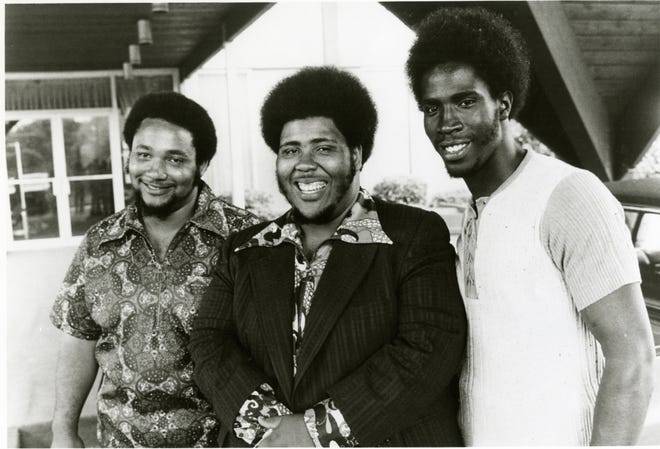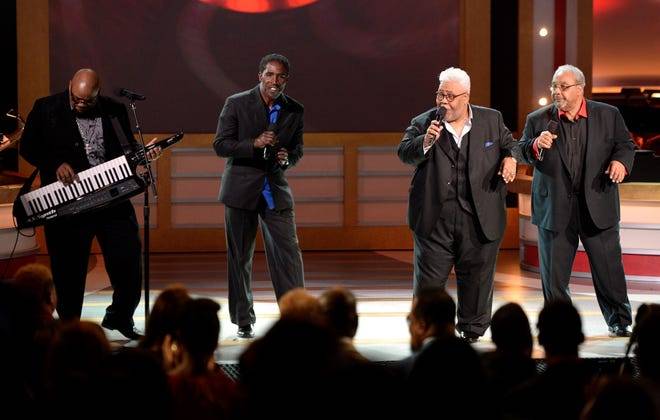MickyDolenz 
|
Rance Allen (November 19, 1948 - October 31, 2020) Bob Mehr • October 31, 2020 • Memphis Commercial Appeal

Gospel musician and Stax Records artist Rance Allen has died. The 71-year-old leader of The Rance Allen Group, who had become a bishop in the Church of God in Christ, died Saturday morning at his home in Toledo, Ohio.
An eight-time Grammy nominee, Allen had grown up in the shadow of Motown, recorded for Stax and been influenced by Chuck Berry, but his songs were always a deeply profound and fervent expression of his religious faith.
"It's music, it’s truth, it's the anointing of God, it's an exciting thing, and you can hear it," Allen noted of his work in a 2011 interview with The Commercial Appeal.
In a statement on his passing, COGIC adjutant general Bishop Robert G. Randolph Jr. said, “Bishop Allen’s unique vocal ministry was an indispensable sound within the Church of God in Christ and Christendom. His gift transcended the boundaries of musical genre.”
“During the Stax Museum's Soul Comes Home grand opening concert in 2003, not only did he get a standing ovation from the crowd at the Orpheum Theatre, but he also was the only artist who got a standing ovation from the other Stax legends backstage,” added Sampson. “He also visited the Stax Music Academy on several occasions and the students were in awe. We will miss Rance and our thoughts are with his family, the members of the Rance Allen Group, his fans and his parishioners."
Allen's public career actually started years before he signed to Stax. As a grade schooler he was prowling the pulpit as a child preacher. “It was preaching first, then singing, then picking up the instruments," recalled Allen. “I was maybe 9 or 10 years old when I picked up the piano. From there it went to guitar and drums and everything else I could get my hands on.”
Allen led a family band — featuring his brothers Tom on drums, Steve on bass and later Esau on percussion — that became a show-stopping act on the gospel circuit.

"Most (religious) artists think entertaining doesn't have anything to do with gospel music," Allen said. "But my grandmother, she wanted us to learn how to entertain. She'd say, ‘If people don't see you're enjoying your stuff, they're not going to enjoy you. Entertain, perform, make folks laugh, make 'em cry. You gotta to be able work the area of emotion.' We always took that advice to heart."
Although Allen was influenced by gospel heavyweights like James Cleveland, his ringing guitar style and finely etched songs bore the marks of rock-and-roller Chuck Berry. “At that time in my life, Chuck Berry was like a superhuman, superhero the way he played guitar,” said Allen. "And while I was concentrating on gospel, I was very much interested in the secular world of music too.”
By the early '70s, after releasing a single on the tiny Reflect label, Allen and his group were primed and ready to break nationally. Naturally, they headed to nearby Detroit to try to land a contract with Michigan music institution Motown.
"We tried to go to Motown, but Motown didn't do gospel at all," recalls Allen. "The next step was to go to Stax Records, and they didn't do gospel at the time either. But [Stax label heads] Jim Stewart and Al Bell liked what they heard, and so they called my manager to tell him they were interested — and interested to the point of trying to possibly come up with a new way to get this record out."
That new way was the formation of The Gospel Truth Records, which would become a spiritual arm for the soul label that would go on to release albums by Rev. Maceo Woods, Louise McCord, 21st Century, and the Rev. Jesse Jackson’s People’s Choir of Operation Push.
"It was a first for Stax, and we were the first ones to record on that label," said Allen. "There's no way we would've gotten the first record out had it not been for Stax having that kind of faith in us. When you got a record company that will say we believe so much in this artist that we will create a label for them. Well, I'm forever grateful for that."
After signing to Stax, the Allen Group would eventually come to Memphis to record, absorbing the city's musicians and players.
"That was a mega, mega step for us. We started studying the musicians down there: people like Duck Dunn and Al Jackson and Bobby Manuel, Lester Snell. We were just amazed by the way they were able to play. We basically went to school on them," said Allen. "That's the reason why, even today, all these many years later, when you listen to our music, you hear the real rich Stax flavor in there."
In 1989, Allen moved to Toledo, Ohio, where he began preaching at the New Bethel Church of God in Christ. In between his ministry, Allen would remain a stalwart presence on the gospel circuit and continued to record and perform.
A frequent visitor to Memphis and Soulsville, he appeared at the Stax 50th anniversary concert in 2007 and visited the Stax Museum and Music Academy numerous times over the past decade.
Allen’s early-‘70s output had actually been given a renewed focus in recent weeks, as Craft Recordings released “The Gospel Truth: Complete Singles Collection,” a retrospective chronicling the Stax imprint that Allen helped usher into existence.

The group was nominated for Grammy Awards in 1981, 1991 and 2004 and inducted into the Gospel Music Hall of Fame in 1998.
In 2018 the group won Stellar Awards named Traditional Duo/Chorus Group of the Year for their recording "Live From San Francisco.”
According to COGIC officials, a private memorial service will be held for Allen this week. You can take a black guy to Nashville from right out of the cotton fields with bib overalls, and they will call him R&B. You can take a white guy in a pin-stripe suit who’s never seen a cotton field, and they will call him country. ~ O. B. McClinton |
 Report post to moderator
Report post to moderator Report post to moderator
Report post to moderator Report post to moderator
Report post to moderator Report post to moderator
Report post to moderator Report post to moderator
Report post to moderator Report post to moderator
Report post to moderator Report post to moderator
Report post to moderator Report post to moderator
Report post to moderator Report post to moderator
Report post to moderator Report post to moderator
Report post to moderator Report post to moderator
Report post to moderator New topic
New topic Printable
Printable





